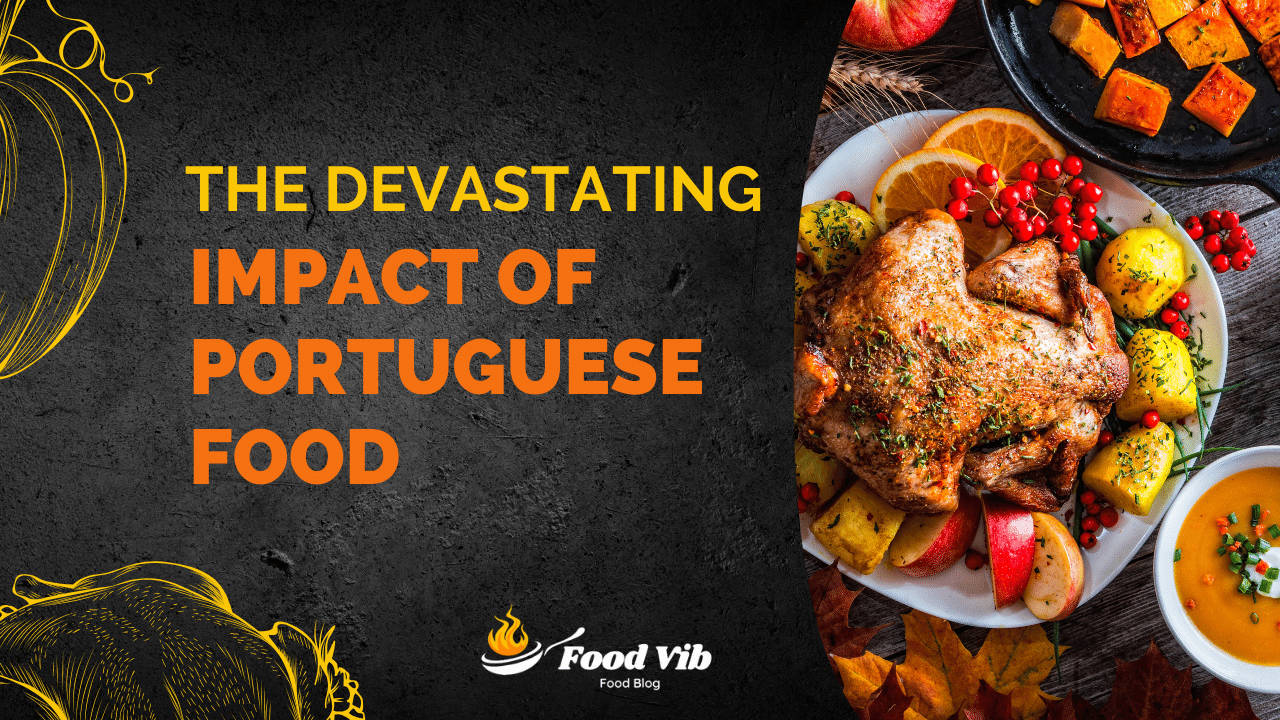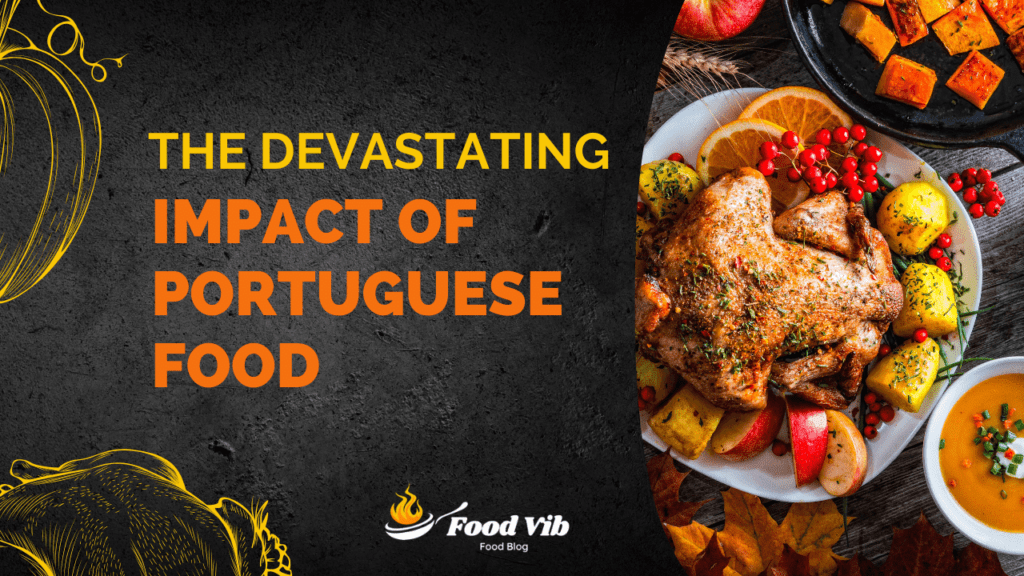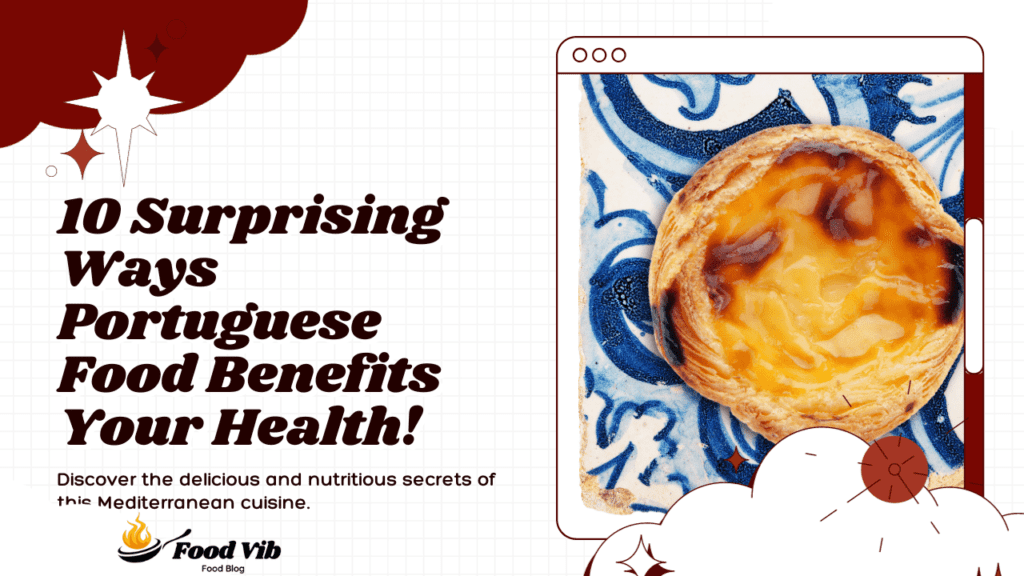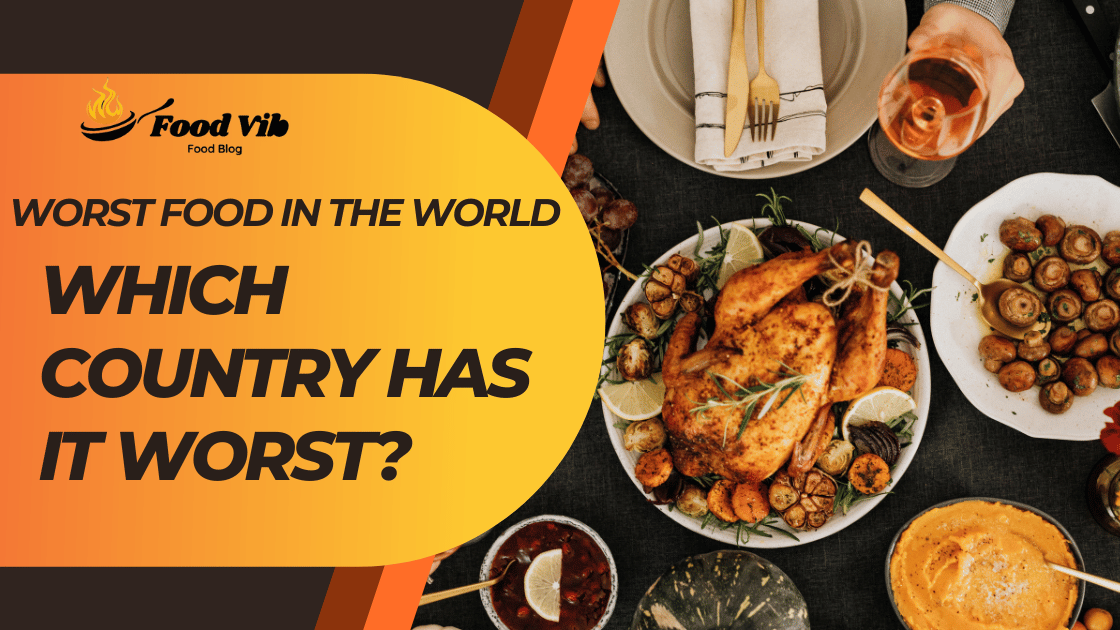The Devastating Impact of Portuguese Food

Portuguese cuisine has had a very negative influence. People all over the globe have fallen in love with it and their taste buds have been captivated by its unusual ingredients and rich tastes. However, the local culinary cultures have also suffered as a result of this passion for Portuguese food. There is a gradual loss of the variety and originality of various cuisines as popular Portuguese meals supplant traditional ones.
This loss has far-reaching effects on cultural identity and legacy in addition to the culinary scene. Portuguese cuisine’s terrible effects serve as a reminder to cherish and protect the many culinary traditions that contribute to the uniqueness of our planet.

The Devastating Impact of Portuguese Food
The gourmet scene is changing dramatically thanks to Portuguese cuisine, a hidden treasure in the food industry. Every area of Portugal, from the lively streets of Lisbon to the tranquil seaside settlements, has a distinct culinary character that piques the interest of the senses. In this piece, we examine the allure and sometimes disastrous effects of Portuguese cuisine on the palate as well as the reasons it is unique among world cuisines.
A Tapestry of Flavors
a.Diverse Influences and Ingredients
Portuguese cooking has various delectable ingredients and a complex tapestry of cultural influences. Each dish, with influences from the Mediterranean, Moorish, and Atlantic regions, narrates the tale of centuries of culinary development. Portuguese food delivers a sensory experience, from the robust tastes of chorizo and piri-piri to the delicate sweetness of pastéis de nata.
b.Seafood Extravaganza
Portugal, which borders the Atlantic Ocean, is known for its abundant seafood, which has come to define its cuisine. There’s no denying the irresistibly wonderful effect of Portuguese seafood. Seafood products, such as fragrant catalase (seafood stew) and juicy bacalhau (salted codfish), are skillfully turned into culinary marvels.
The Quintessential Portuguese Delights
a.Pasties de Natta: A Sweet Symphony
When you go into any Portuguese bakery, the delicious scent of pasties de anta will welcome you. With their creamy filling and flaky dough, these custard tarts are a sweet symphony that has taken over dessert tables all over the globe. Pasties de anta are a tempting indulgence because of their destructive effect, which is reflected in the smiles they bring to faces.
b.Francesinha: A Meat Lover’s Paradise
For individuals who like savory foods, Portuguese creativity is shown by the Francesinha. A carnivore’s dream come true, this sandwich is stacked with cured meats and covered in a hot sauce mixed with beer. Unmatched in its devastating effect on taste receptors, it leaves an impression that entices connoisseurs to return for more.
The Global Influence
Portuguese Fusion: A Culinary Revolution
Portuguese food has a terrible influence outside the Iberian Peninsula. Portuguese fusion restaurants, which combine traditional tastes with other cuisines to create a seamless fusion, have become more popular in the world of gastronomy. The legacy of Portuguese culinary mastery is being permanently imprinted from Lisbon to London.
Beyond the Plate
Cultural Significance
Portuguese cuisine is a symbol of the country as much as a culinary delight. Every meal captures the culture, geography, and history of this dynamic country. Beyond flavor, the devastating effect builds a bridge between cultures by bringing people together via common culinary experiences.
Devastating impact
There is no denying that Portuguese cuisine has had a disastrous influence on world cuisine. Portuguese cuisine has carved out a special place for itself, with its rich and varied influences, unmatched seafood offers, and classic dishes like pasties de anta and Francesinha. It is becoming a force to be reckoned with in the world of gastronomy as its worldwide impact grows.
Must Read: What Are the Risks of Eating 5 Day Old Chinese Food?
What Makes the Impact of Portuguese Food So Devastating?
Portuguese food has had a lasting impact on the culinary globe and is considered a gourmet treasure trove. Its effect is catastrophic, in the most beautiful way possible. In this investigation, we break down the components that give Portuguese cuisine its powerful allure, telling a story of tastes, customs, and culinary expertise.
Combining Various Influences
The Fusion of Diverse Influences
Mediterranean, Moorish, and Atlantic Fusion
Portuguese cuisine’s disastrous effects start with its distinctive fusion of flavors. Portuguese food, with its roots in the Mediterranean, a touch of the Atlantic, and spices from the Moors, is a symphony of varied tastes that dance over the palate. Portuguese cuisine is unique due to this blending of culinary traditions, which creates a sensory experience unlike anything other.
The Bounty of the Atlantic
Seafood Sensation
The wealth of the Atlantic Ocean sits at the core of Portuguese gastronomic prowess. The crushing influence of Portuguese seafood is apparent in recipes with the finest fish that have been skillfully turned into delectable entrees. Seafood becomes a feast that enthralls and leaves a lasting impact, from the famous bacalhau to the fragrant catalane.
Culinary Artistry: Pasties de Natta
Heavenly Custard Tarts
It would be impossible to talk about the destructive effects of Portuguese cuisine without bringing up pasties de anta. With their flaky dough and creamy filling, these delectable custard tarts are a masterpiece of culinary skill. Their influence comes from their delicious flavor as well as their capacity to take fans to the quaint streets of Lisbon with every mouthful.
Francesinha: A Spicy Meat Extravaganza
Carnivore’s Delight
The Francesinha is a must-try for individuals who like savory treats. This sandwich is a meat lover’s dream come true—it’s a symphony of cured meats covered in a hot, beer-infused sauce. Its destructive effect on taste receptors is unmatched, leaving a lasting impression that begs to be returned to its delectable embrace.
Worldwide Influence of Cuisine.
Global Culinary Influence
Portuguese Fusion Beyond Borders
Portuguese cuisine has a huge influence outside of its own country. Portuguese fusion restaurants, which combine traditional tastes with other cuisines to create a seamless fusion, have become more popular worldwide in the culinary scene. The destructive effects are considerably exacerbated by this cross-cultural pollination, which establishes Portuguese food as a dominant force in world cuisine.
Beyond Taste: Cultural Resonance
A Culinary Chronicle of Culture
Portuguese cuisine has a disastrous effect on more than just taste. Every meal is a culinary history that reflects the topography, history, and deeply held customs of the country. Through shared experiences and an influence that goes beyond the plate, Portuguese food serves as a bridge across cultural divides.
Must Read: A Closer Look at the Meaning of Rich in Food
10 Unbelievable Ways Portuguese Food Can Impact Your Health.

In addition to being known for its mouthwatering tastes, Portuguese food has some surprising health risks. Though the food options are sometimes too good to ignore, you should be mindful of the possible effects on your health. This article reveals 10 amazing ways Portuguese cuisine may unintentionally negatively impact your health.
1. Salted Cod (Bacalhau): A Sodium Overload
Although delicious, the popular Portuguese meal Bacalhau may be a secret source of too much salt. High salt consumption is associated with cardiovascular problems and hypertension. Consume in moderation to fully enjoy the flavor without endangering your health.
2. Francesinha’s Caloric Conundrum
A calorie-dense treat for meat lovers is the Francesinha. This meal, which is loaded with cured meats and covered with a thick sauce made with beer, may cause weight gain and other health issues if it is regularly eaten.
3. Pasties de Natta: A Sugary Temptation
Pasties de Natta’s sugary symphony has a delightful side effect. Although these custard tarts are delicious, anyone managing their sugar consumption should be cautious since they contain a lot of sugar. To balance pleasure and health, enjoy as a rare treat from time to time.
4. Couric and Present: Beware of Processed Meats
Processed and cured meats, such as Couric and Present, are often seen in Portuguese cuisine. These meats’ high salt and preservative contents may be a factor in health problems including high blood pressure and a higher chance of contracting certain illnesses.
5. Caldor Verde’s Saturated Fat Trap
The well-known green soup enhanced with chorizo, Caldor Verde, has the potential to be a saturated fat trap. Overconsumption of saturated fat is linked to cardiovascular risks and cholesterol issues. To enjoy the taste without jeopardizing heart health, consume in moderation.
6. Bizana: The Hidden Culprit of Trans Fats
Even if the Bizana is indisputable for its delicious flavor, using certain cooking oils may introduce Tran’s fats. Consuming trans fats in excess has been connected to heart disease and other health problems. Make sure you choose your oil carefully in advance to reduce this danger.
7. Bolitho de Bacalhau: Fried Sensation, Fried Risks
Though delicious, Bolitho de Bacalhau’s crunchy deliciousness often necessitates frying. Eating fried food often is linked to elevated cholesterol levels and weight gain. Eat in moderation to appreciate the flavor and put your health first.
8. Arrow de Pate: The Carb Conundrum
The meal Arrow de Pate, which consists of duck and rice, may lead to an overabundance of carbohydrates. For people trying to maintain a balanced diet or control blood sugar levels, monitoring carbohydrate intake is essential. To maintain a healthy carbohydrate balance, savor mindfully.
9. Quito da Serra: High in Fat Content
The rich taste of Portuguese cheeses, particularly Quito da Serra, is well known. It does, however, have a significant fat content. Cheese consumption should be restricted for those who are concerned about their general health and fat intake.
10. Portuguese Desserts: A Sugar and Fat Extravaganza
The wide variety of Portuguese sweets, however delicious, together provide an excess of sugar and fat. Frequent overindulgence may lead to health problems and weight gain. Consuming dessert in moderation is essential if you want to indulge without endangering your health.
Conclusion
In summary, even if Portuguese food is delicious, it’s important to approach it mindfully in terms of your health. A balanced diet, moderation, and ingredient knowledge are necessary to enjoy the tastes without giving in to any possible health risks.
Must Read: The Surprising Health Benefits of Eating Chinese Food
FAQ (Frequently Asked Question)
What are the key elements that make Portuguese food unique and distinct from other European cuisines?
Portuguese cooking is known for its use of a variety of spices, olive oil, and garlic to create a harmonious blend of tastes. Another unique characteristic is the abundance of meals that incorporate bacalhau, or salted codfish.
How has Portugal’s history and exploration impacted its culinary traditions?
Portugal's long history of discovery has resulted in a combination of tastes in its food, including African, Asian, and American influences. During the Age of Discovery, new ingredients such as chili peppers, tomatoes, and spices were discovered.
What role do traditional Portuguese markets play in preserving and promoting the country’s culinary heritage?
Customary marketplaces, like Lisbon's Mercado da Ribeira, highlight the variety of Portuguese products and help to maintain traditional cooking methods. These marketplaces are crucial to both tourists and local populations.
Can you outline the main characteristics of Portuguese pastries and desserts?
Portuguese pastries with creamy custard contents and distinctive flaky crusts are well-known, such as Pastel de Nata. Egg yolks and sugar are often used to create decadent sweets that are well-known around the world.
How does the Mediterranean diet influence the overall healthiness of Portuguese cuisine?
Portuguese cuisine is heavily influenced by the Mediterranean diet, which is high in seafood, fruits, vegetables, and olive oil. According to studies, there may be benefits to this diet for general health and cardiovascular health.
In what ways does Portuguese cuisine cater to vegetarians and vegans?
Although meat and seafood are staples of Portuguese cuisine, vegetarian and vegan choices are becoming more and more popular. Recipes like as "Feijoada Vegetariana" demonstrate a dedication to serving a variety of nutritional needs.
How does the traditional Portuguese custom of family meals contribute to the cultural significance of the country’s food?
Portuguese culture places great emphasis on family dinners as a means of establishing a feeling of belonging and community. Culinary customs are transmitted from generation to generation by the sharing of customary foods among family members.
Are there any concerns regarding the impact of traditional Portuguese diets on health and nutrition?
Portuguese food is rich and varied, but since it uses a lot of salt, oil, and fatty meats, there are worries about possible health effects. But in order to enjoy the food properly, moderation and balance are essential.
How can an exploration of the devastating impact of Portuguese food shed light on the challenges related to modern dietary trends and health issues?
The good qualities of Portuguese cuisine, including its richness and heritage, as well as any possible drawbacks, like health problems linked to nutrition, must be taken into account while analyzing its effects. This investigation may add to a larger discussion about striking a balance between contemporary health concern and culinary tradition.






2 Comments